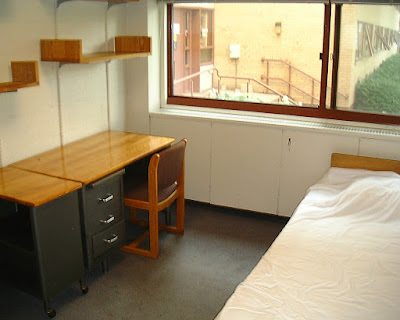Change Facilitates Change
In
my sophomore year of college I had an
interesting roommate. He was a guy who folded his clothes, followed methodical lists, and as the RA, enforced the
rules on our hall full of freshmen with an iron fist. Every couple of weeks or so this
roommate of mine would try to broker a deal with me to rearrange our room. To change things up.
The problem with this was I preferred stagnation to change. I happened to like my clothes piled up in a rotten heap right in the middle of the floor. I enjoyed having my bed in the same corner of the room and my desk facing the window. My roommate's calls for reformation were almost always met with my hard line resistance, because consistency gave me a level of comfort. "Why change our room when it is working fine?"
College was a busy time for me with frequent due dates and schedules changing from week to week. New projects required schedule accommodation and it seemed as if there was always something else going on vying for my attention. My room, quite simply, was one thing I would like to remain constant. Just give me one thing!
My roommate was persistent. I believe we rearranged our room at least four times that sophomore year, which for me was a little much. After moving our dressers and bunk beds--and after my psychological preparations to sleep at a different elevation--my roommate would always conclude our interior renovations with the same speech: "Change is good, Dan. Change facilitates change.”
I eventually realized that these words were more than a passive aggressive rant directed at my boring routines. I think. What my roommate meant was: Change is a good way to consistently combat our tendencies of stagnation.
Because if you are anything like me, you also have proclivities to get stuck in ruts. Structure is important, necessary even, and I am a big advocate of meaningful habits; but structure becomes hazardous when it goes unchecked and continually assumed. We have all been there before. Routines and practices which were originally created for a purpose have become something comfortable and pedestrian. We then find ourselves going through the motions, doing enough just to get by, and all the while watching the days pass by one after the other. After the other.
We have gotten “stuck.” Or worse yet we have gotten comfortable and do not mind being “stuck.”
We need to heed my former roommate’s wisdom and discover ways to "facilitate change" in our day to day lives, even if those ways are as simple as rearranging a room or altering a bedtime. We need to understand our human tendencies to the ever tranquil stagnation and always be evaluating, always be asking why, and always be looking to improve. We can never be satisfied where we are, nor can we grow content. Why? Because we have not yet become what we have been called to become.
Instead of looking at every change as a threat to the status quo, I suggest that we begin looking for changes that do exactly that: threaten the norm. Let’s dare to enter the new and stretch ourselves further, especially if it is met with resistance from within. And maybe with all this changing, we might even find ourselves changed in the process.
***
Brothers and sisters, I do not consider myself yet to have taken hold of it. But one thing I do: Forgetting what is behind and straining toward what is ahead, I press on toward the goal to win the prize for which God has called me heavenward in Christ Jesus.
-Phil 3:13-14
The problem with this was I preferred stagnation to change. I happened to like my clothes piled up in a rotten heap right in the middle of the floor. I enjoyed having my bed in the same corner of the room and my desk facing the window. My roommate's calls for reformation were almost always met with my hard line resistance, because consistency gave me a level of comfort. "Why change our room when it is working fine?"
College was a busy time for me with frequent due dates and schedules changing from week to week. New projects required schedule accommodation and it seemed as if there was always something else going on vying for my attention. My room, quite simply, was one thing I would like to remain constant. Just give me one thing!
My roommate was persistent. I believe we rearranged our room at least four times that sophomore year, which for me was a little much. After moving our dressers and bunk beds--and after my psychological preparations to sleep at a different elevation--my roommate would always conclude our interior renovations with the same speech: "Change is good, Dan. Change facilitates change.”
I eventually realized that these words were more than a passive aggressive rant directed at my boring routines. I think. What my roommate meant was: Change is a good way to consistently combat our tendencies of stagnation.
Because if you are anything like me, you also have proclivities to get stuck in ruts. Structure is important, necessary even, and I am a big advocate of meaningful habits; but structure becomes hazardous when it goes unchecked and continually assumed. We have all been there before. Routines and practices which were originally created for a purpose have become something comfortable and pedestrian. We then find ourselves going through the motions, doing enough just to get by, and all the while watching the days pass by one after the other. After the other.
We have gotten “stuck.” Or worse yet we have gotten comfortable and do not mind being “stuck.”
We need to heed my former roommate’s wisdom and discover ways to "facilitate change" in our day to day lives, even if those ways are as simple as rearranging a room or altering a bedtime. We need to understand our human tendencies to the ever tranquil stagnation and always be evaluating, always be asking why, and always be looking to improve. We can never be satisfied where we are, nor can we grow content. Why? Because we have not yet become what we have been called to become.
Instead of looking at every change as a threat to the status quo, I suggest that we begin looking for changes that do exactly that: threaten the norm. Let’s dare to enter the new and stretch ourselves further, especially if it is met with resistance from within. And maybe with all this changing, we might even find ourselves changed in the process.
***
Brothers and sisters, I do not consider myself yet to have taken hold of it. But one thing I do: Forgetting what is behind and straining toward what is ahead, I press on toward the goal to win the prize for which God has called me heavenward in Christ Jesus.
-Phil 3:13-14




Comments
Post a Comment